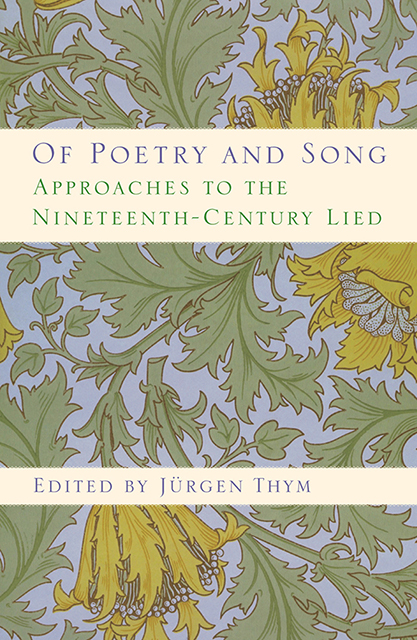Chapter Sixteen - Discovering “Musical Impressionism” by Way of Eichendorff and Schumann: Wolf and Pfitzner at the Threshold
Published online by Cambridge University Press: 02 March 2023
Summary
When Hugo Wolf decided in the late summer of 1888 to compose a volume of Eichendorff settings (interrupting the composition of the Moerike songs for a month), he knew his work would be compared to Schumann's Eichendorff songs, especially the Liederkreis, op. 39. Determined to set out on a course different from that of his predecessor (who had focused on Eichendorff's nature mysticism and symbolism nearly fifty years earlier in a handful of exquisite settings), Wolf, by and large, stayed away from the poems (or the type of poem) Schumann had used. He selected for his settings mainly Rollengedichte, poems of a dramatic nature in which the protagonists characterize themselves through what they say, and he drew from these poems inspiration for an entire gallery of finely chiseled musico-dramatic miniatures—often humorous, sometimes demonic. He thereby sharpened his skills as a portrait composer, which a few years later found another outlet in the composition of the Italian Songbook (fig. 16.1).
Looking back a few years later to his Eichendorff settings, Wolf stated—not without pride—in a letter to Engelbert Humperdinck in 1891 that in composing the Gedichte von Eichendorff, he discovered a rather unknown side of the poet (Wolf speaks of himself here in the third person, camouflaging the praise he bestows on himself):
In accordance with the more realistic movement in the arts [that arose in the second half of the nineteenth century], the Romantic element in the Eichendorff songs recedes almost completely in the background. The composer, on the contrary, has preferred the pointedly humorous and robustly sensuous side of the poet which is rather unknown, and he has drawn some successful features from it. [Wolf then names some of the songs.]
Wolf's remarks, once published, have sent several generations of interpreters and critics to explicate his approach to the Lied as that of a musical dramatist, someone who was a miniature Wagner (writing three-minute music dramas) and who perhaps could even be considered a representative of verismo in the genre of the Lied.
- Type
- Chapter
- Information
- Of Poetry and SongApproaches to the Nineteenth-Century Lied, pp. 409 - 436Publisher: Boydell & BrewerPrint publication year: 2010



